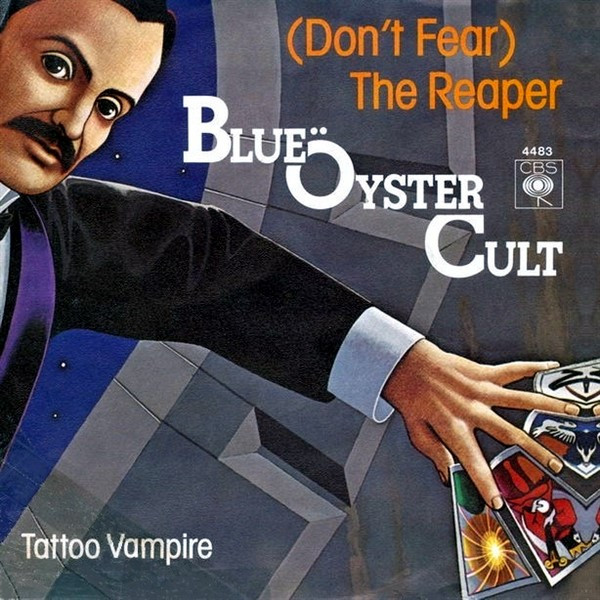Blue Öyster Cult: (Don’t Fear) The Reaper
[purchase]
For the second post in a row, I’m writing about a band that I know pretty much nothing about, although unlike Thunderclap Newman, Blue Öyster Cult had a career that spanned decades. Before I started to write this piece, literally the only song of theirs that I could name was our featured song, “(Don’t Fear) The Reaper,” but after reading a little about the band, I realized that I also knew the song “Burning For You,” although I didn’t know that it was by BOC.
If you are still reading this, despite the fact that I’ve basically told you that I’m ignorant about the subject, I appreciate your sticking with me. I’ll try to make it interesting and fun.
Blue Öyster Cult was formed in 1967(!) at Stony Brook University, when critic, producer, music business executive, poet, college professor, and manager Sandy Pearlman heard a jam session and offered to manage the band. For what it is worth, Pearlman seems like a fascinating figure in music, and probably deserves his own post. Originally named Soft White Underbelly, the band’s sound started off psychedelic, but gradually moved toward hard rock. After cycling through a number of pretty bad names, they ended up as Blue Öyster Cult in 1971, derived from one of Pearlman’s poems. The umlaut was added later, but who came up with using the much-imitated diacritic is a matter of dispute.
After recording two albums of material that was not released at the time, except for a small promo release of a single, the band’s self-titled debut album was released in 1972. They released an album a year, with increasing success, until 1976’s Agents of Fortune spawned “Reaper,” the single version of which reached 12 on the Billboard chart and was a fixture on the radio when I was in high school. The song was written and sung by lead guitarist Donald “Buck Dharma” Roeser, and not the band’s main singer, Eric Bloom.
If you’ve made it this far, I’m pretty sure that you know what the song sounds like—you’ve probably heard it a million times. Because it is a great song. I remember someone at WPRB trying to convince me to listen to and play other Blue Öyster Cult songs on the radio, but I never really tried hard to listen to them (honestly, there were so many other artists, old and new, that grabbed my attention in those days).
As Dharma explained,
I felt that I had just achieved some kind of resonance with the psychology of people when I came up with that, I was actually kind of appalled when I first realized that some people were seeing it as an advertisement for suicide or something that was not my intention at all. It is, like, not to be afraid of [death] (as opposed to actively bring it about). It's basically a love song where the love transcends the actual physical existence of the partners.
So, let’s talk about the cowbell.
It was overdubbed on the original recording, and it is credited to drummer Albert Bouchard, although at least two other people have claimed to have played it. Whoever actually did, there’s no question that, as bassist Joe Bouchard (Albert’s brother) recalled, “It really pulled the track together.” And, of course, it became more famous in a 2000 Saturday Night Live sketch, in which Christopher Walken, portraying producer Bruce Dickenson (an actual record producer, but who had nothing to do with the song) demanded “more cowbell.” Apparently, the band loved the sketch. (As do my friends in the Princeton Class of 1983, who have adopted “More Cowbell” as an unofficial motto).
Blue Öyster Cult has continued to tour and release music, with some personnel changes, to the present day, and currently includes both Dharma and Bloom in its lineup.































































































































































































































































































































































































